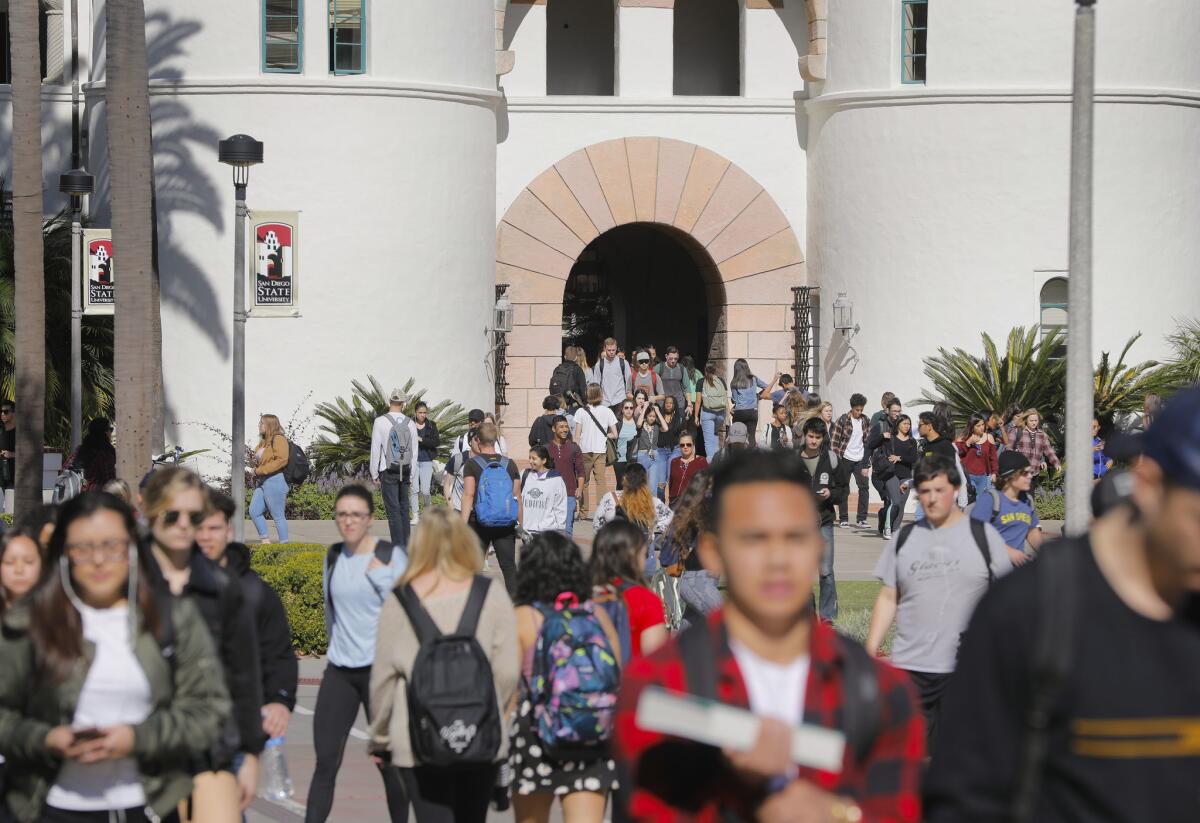Proposal to revoke emeritus professor status brings ‘cancel culture’ debate to San Diego State

School considers plan to penalize professors whose conduct harms the university.
A proposal to strip professors of their emeritus status if they do anything to harm the reputation of San Diego State University is causing a backlash among faculty who say the policy would suppress free speech and stoke what some call the “cancel culture” movement.
This is the second major free speech controversy to roil the campus since winter, and the new policy raises the possibility that a professor could be penalized for comments that he or she made in the past.
The proposal says that San Diego State’s president, on the advice of the University Senate, would have the right to revoke a professor’s emeritus status based on conduct that occurred before or after he or she was granted the honorary title. Such conduct would have to harm the university’s reputation. The committee did not specify what that means.
The policy takes aim at a coveted perk. Emeritus status at the university comes with many benefits, potentially including office space, library privileges, health and dental coverage, use of computer systems and the right to conduct research.
The proposal was made in early July by the Academy Policy and Planning Committee, a little-known group that advises the University Senate. It would require Senate approval to be enacted.
D.J. Hopkins, the committee’s chairman, would not comment on the proposal, deferring to university administrators.
“The drafted, preliminary policy language is not in response to any one individual, but rather in response to lapse in existing policy,” the university said in a statement this week.
“Currently, there is no way to revoke emeritus status should an emeritus faculty, staff or administrator violate university policy or commit a criminal act.”
San Diego State said the proposal could go through committees and end up before the Senate in the fall.
Some faculty members say the policy appears to be directed at figures such as Stuart Hurlbert, an 81-year-old retired biology professor who often talks about such issues as immigration, diversity and race.
The university’s Biology Graduate Student Assn. recently posted a petition online that asks the university to revoke Hurlbert’s emeritus status.
“Dr. Hurlbert has used biology department space and resources to distribute racist manifestos and texts filled with diatribes designed to cast doubt on the value of diversity,” the petition says, in part. “He posted outwardly racist materials in the North Life Sciences building that remained for years and are seen by undergraduates, graduates, faculty and staff.
“In 2008, Dr. Hurlbert used his SDSU email address to call Mexico a ‘hostile nation’ with ‘many agents in our society’ in support of Arizona SB 1070, anti-immigrant legislation,” the petition continues.
“I have never written anything racist,” Hurlbert said in an interview. “I have never put anything on a bulletin board that is racist. I have never sent an email that is racist. I do not belong to any racist organizations. I worked in Latin America for 30 years. I am more fluent in Spanish than many who self-label as Hispanic, on campus and off.”
It is unclear when and if the policy will come before the University Senate. But opposition is already forming.
“It seems to me that the proposal is an attempt on the part of SDSU to discredit criticism and oppositional voices, and drown out dissent,” said Peter Atterton, a philosophy professor and member of the Senate.
“The focus at a university should be on what is true, not on what makes the university look better than it is. Again, SDSU is there for the public good, not to further its own interest.”
Mike McCall, a sociology professor, told some colleagues in an email, “The language [in the proposal] is so appallingly vague it ought not have received a second of thought among academics, let alone seemingly be making its way through the policy consideration process.
“Emeritus status is bestowed as an honor for prior service — service that could ostensibly include making statements or engaging in activities that were embarrassing to the university but that would be fully protected while a member of the traditional faculty. Yet, the same behavior would now justify removal of emeritus status. It is intellectually inconsistent if not dishonest,” he wrote.
The proposed policy also bothers Peter Herman, a literature professor who is nearing retirement.
“I could be a target since I have written numerous op eds critical, sometimes highly critical, of SDSU’s actions, and so, arguably, ‘harmed the university’s reputation,’” Herman said.
“I would say in my defense that it is the university which harmed its own reputation — I just pointed out what happened — but the potential is still there.”
Herman also questioned how far back the alleged behavior could go to merit rescinding emeritus status.
“Could my column pointing out President [Adela] de la Torre’s spending habits or the one about anti-Semitism at SDSU, since neither enhanced the university’s reputation and probably detracted from it, be used to deny me emeritus status?
“The answer is, on the basis of the proposed policy, clearly yes,” he concluded. “The chilling effect of this proposal is enormous.”
The controversy comes eight months after San Diego State ran into free speech issues involving a graduate student who had proposed a campus summit on U.S. reparations for slavery.
The university praised the student’s idea until it was pointed out that he wanted the speakers to include Ava Muhammad, who speaks on behalf of Nation of Islam leader Louis Farrakhan. Groups such as the Southern Poverty Law Center have accused Farrakhan of anti-Semitism.
The university initially supported the student, Terry Sivers, saying in a statement, “In some cases, speakers may be invited to speak on a specific topic of interest despite having viewpoints in other areas that are not in alignment with the values and beliefs of our community.”
But as public opposition grew, Sivers dropped Muhammad’s name from consideration, and the university issued a new statement saying, “The student’s proposed speaker list previously included those who have espoused anti-Semitic rhetoric in the past. We strongly reject anti-Semitic, and other disparaging messages and actions. SDSU will offer support to the student organizer to ensure that the original basis for the event — a critical exploration of slavery and reparations — can proceed.”
Events such as a summit cannot currently be held at SDSU because of the COVID-19 pandemic.
Robbins writes for the San Diego Union-Tribune.
More to Read
Start your day right
Sign up for Essential California for news, features and recommendations from the L.A. Times and beyond in your inbox six days a week.
You may occasionally receive promotional content from the Los Angeles Times.







